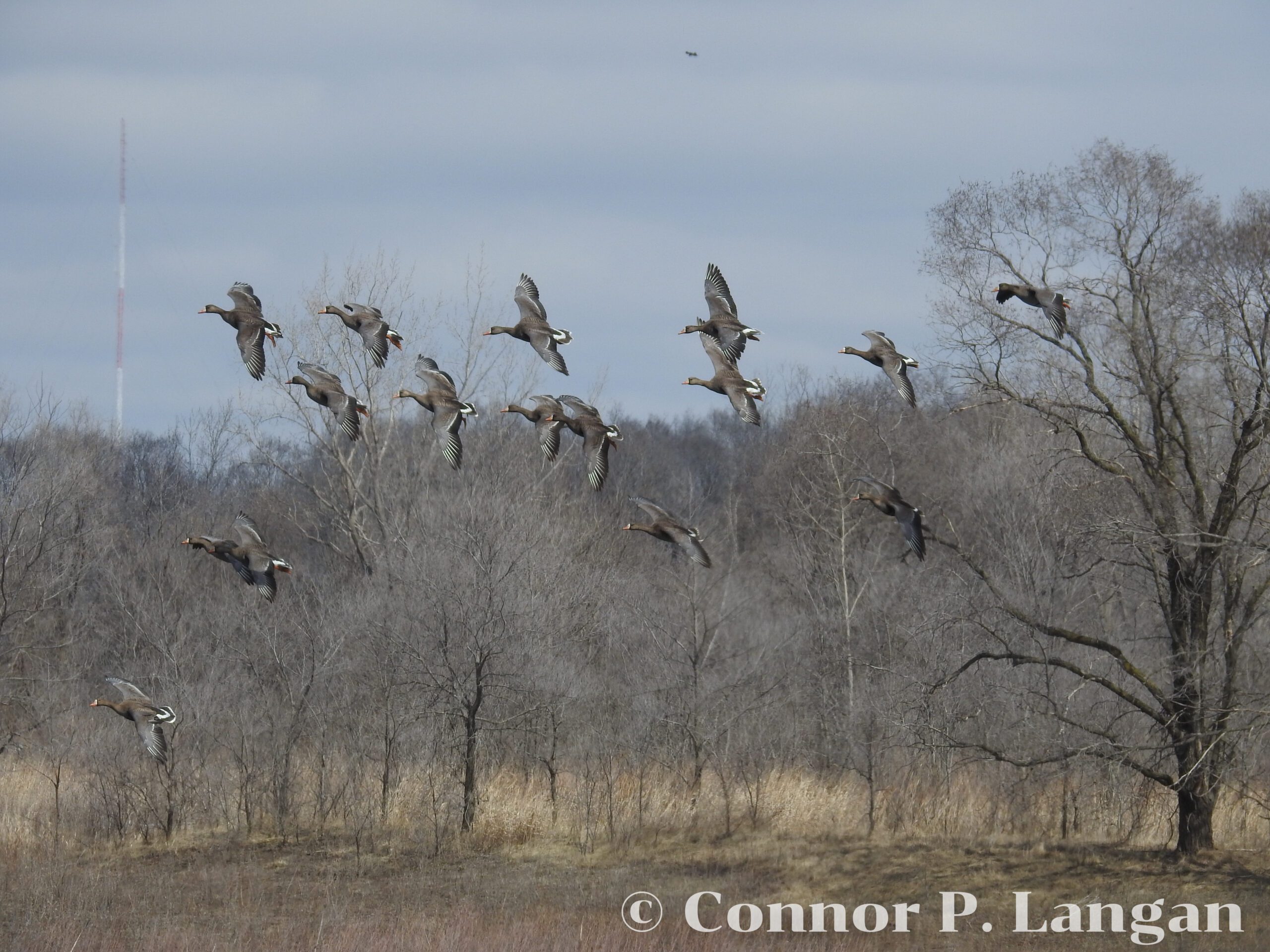Anyone who has spent even the slightest bit of time outdoors has surely noticed a flock of geese flying in unison overhead. Some may think that the incessant vocalizations by these waterfowl are simply made to tease humans below. Those who have noticed these birds have undoubtedly observed that they make noise in flight, but why do geese honk when they fly?
There are many reasons why honking occurs when geese fly. All of the reasons that a goose may honk in flight have to do with communication, for a honk is a goose’s way of vocalizing and sharing information.
Table of Contents
Now that I’ve provided a broad answer to the question, “Why do geese honk when they fly?” allow me to go more in depth.
Why Do Geese Honk When They Fly?
Deciding Where To Land
If you wonder, “Why do geese make noise when they fly?” then know that one of the primary reasons involves deciding where to land. This is so because the location that they select could be the difference between life and death.
Geese have to learn to avoid predators and hunters on their migratory journeys. Choosing a bad spot to land could result in casualties for the group, so geese have to communicate to give themselves a greater chance of survival.

Of course, geese will not always choose the perfect spot to land. There will be times when a flock is deceived by hunters who have placed goose decoys in an area. However, those who survive such an ordeal will be better equipped to avoid such a situation in the future.
Honking in flight is the best way for geese to determine where to land. A honk can relay information about food, habitat suitability, and potential sleeping spots. Therefore, geese honk to communicate about both suitable and unsuitable locations for landing.
Navigation
A flock of geese flying together may honk to relay information about navigation. Birds are adept at navigating using a variety of cues, but it can be challenging for a flock of geese to pinpoint exactly where it wants to land.
Geese honking from a flying flock overhead can be used to share information about directionality and other navigational details. If a few geese are off on their navigation, the remainder of the flock will surely correct them and get them going in the right direction.
Safety
Geese may encounter several treacherous obstacles during their flights. Some dangers include radio towers, wind turbines, trees, and buildings. To avoid these dangers, geese that first observe these obstacles need to honk to alert the rest of the group.
Communicating Their Position
If geese are flying at night, members of the group will need to honk frequently to communicate their position within the formation to others. This behavior helps keep the group together and maintain the efficiency of the formation.

Geese flying in the front of a formation use more energy than the geese trailing behind them. Therefore, geese frequently rearrange the order of their formation so no individual burns too much energy while migrating. The rearrangement of a formation is typically initiated with a series of honks.
Do All Geese Honk?
Do all goose species honk? Most are certainly familiar with honking geese species like Canada Geese, but some may wonder if all birds classified as geese are known to honk.
All species of goose vocalize in some capacity. Some species make distinctive honk-like noises, while others may make high-pitched squeals or chirps.
Compare Canada Geese to Greater White-fronted Geese, for example. Both of these species are native to North America, but their vocalizations are completely different. A Canada Goose makes a distinctive, honk-like sound, while a Greater White-fronted Goose makes a high-pitched call.
Do All Geese Honk When They Fly?
Okay, we know that all geese make honking noises, but all geese communicate in flight. So, why do geese make noise when they fly?
Well, honking or making other noises in flight is a standard and expected behavior for geese. Considering that geese are not able to communicate in other ways during flight, honking is the best option for these birds. Therefore, all geese honk while flying.
Why Would A Single Goose Honk In Flight?
After reading about how the primary reasons that geese honk in flight have to do with communication with other geese, you may be puzzled if you see one goose honking overhead. Does this bird just want to talk to itself – why do geese honk when they fly if they’re all alone?
It turns out that there may be several instances in which you may hearing repeated goose honk vocalizations from a bird overhead. Let’s take a look:

Communication With Geese On The Ground
A lone goose that is about to land among a group of geese on the ground will commonly honk as it is descending to join its feathered friends. In doing so, the bird makes the geese on the ground aware of its intentions.
The individual may also be looking for feedback from the geese on the ground about the food quality and safety of the site before it lands. If you see a lone goose honk in the sky and notice a flock of geese below, it is likely trying to communicate with the other geese.
It’s Separated From Its Flock
A lone goose that seems to be aimlessly flying around while honking may have been separated from its flock. Geese are occasionally separated from their groups during migration or in instances where a flock suddenly has to take flight.
No matter the case, a loner will surely want to find its friends and resume its migration or day-to-day activities. Uttering goose honk noises as it searches for them is its best chance to contact its group.
Signaling A Predator Below
If you notice a single goose frantically flying around while making agitated-sounding honks, then you may be perplexed by this behavior. Why do geese honk when they fly around frantically?
A goose behaving in such a way may be advertising the presence of a predator below. Mother geese that are flushed off of their nest by a predator may try to distract the predator by honking as they fly around. This tactic is employed in an attempt to prevent the predator from finding eggs or nestlings. A mother goose is capable of chasing off small predators like crows and raccoons. However, large predators like coyotes and foxes may cause an adult to flush.
Why Do Geese Honk On The Ground?
We may be most likely to notice the honking of geese when they’re flying overhead, but this is not the only time that geese make noises. Indeed, many are familiar with angry, honking geese that waddle along the ground. So, why do geese honk on the ground?
Remember, honking is the primary form of auditory communication for these birds. Just as humans frequently talk to one another, so too do geese honk at each other. A goose on the ground will have just as much to say as a flying goose.

Yes, these waterfowl obviously need to communicate on the ground in addition to when they’re in the air, so they may honk on the ground to convey a range of signals and emotions.
Geese commonly honk on the ground to proclaim their territories. A male songbird defines the borders of its territory by singing, but geese must resort to honking because they are not able to sing. Loud, rapid honks from a goose on the ground often mean that a territorial dispute is imminent.
Do Geese Communicate In Ways Besides Honking?
When people imagine how geese communicate, they will immediately think of a honking goose. However, some may be surprised to know that these animals have several other means of communication.
Hissing
Anyone who has invaded a goose’s personal space bubble was likely met with an agitated hiss. A person, animal, or counterpart may be met with this behavior if they overstep their bounds, but why do geese hiss?
Well, hissing is a way of warning potential intruders to keep their distance. Goose parents who are protecting goslings are very defensive of their young. These fierce parents will hiss at anyone who approaches their babies too closely. If you don’t heed their warnings, they may lash out.
Body Language
Many animals use body language as a means of communicating their emotions, and geese are no different. Geese have a complex body language system that is used to convey a large range of emotions.
When a goose wants to intimidate another, it may puff out its chest and make itself look as big as possible. A defensive bird will often move with slow movements while maintaining a very rigid posture.
If you spend a considerable amount of time around geese, try paying attention to these birds and try to discern what their different body language signals mean.

Head Bobbing
A head-bobbing goose may be a silly sight to see, but what does this behavior signify?
Head-bobbing may be used for a couple of reasons. First, geese that are trying to initiate courtship often engage in a ritualized series of head bobs. When two geese are performing a courtship ritual, the head-bobbing is at its most complex. Head-bobbing helps a goose to reinforce the pair bond with its mate.
Head-bobbing can also be used to warn intruders that they are infringing on a goose’s territory. If a head bob is followed by a hiss, you can infer that the goose wants you to back off.
Why Do Geese Honk During Takeoff?
Some of the loudest honking that geese seem to participate in is honking during takeoff. Such honks may seem excessively loud and unnecessary, so what is the purpose of these vocalizations – why do geese honk while flying during takeoff?
At this point, you know that geese often have far more nuanced reasons for honking than most would imagine, and instances in which geese honk during takeoff are no different. If a group of geese is suddenly flushed from the ground, there will surely be a frenzied series of honks as the group tries to communicate the situation to other geese.
If an entire group of geese flushes off the ground, they may honk during takeoff to determine where they’re going to fly, or the honks may serve the purpose of establishing positions within the formation.
Whatever the case, goose honks during takeoff are purposeful and often convey considerable importance from a goose’s perspective.
Conclusion
Let’s quickly go over a few of the main points from this article:
- Why do geese honk when they fly?
- Geese honk when they fly to communicate a variety of information about position, navigation, safety, and more.
- Why do geese squawk when they fly?
- Some goose honking sounds more like squawking than honking, but such sounds have the same purposes as honking.
- Why do geese honk on the ground?
- Hearing geese honking from the ground may indicate a goose is being territorial, protective of young, or simply interested in communicating with other geese.
- Do geese make noise at night?
- Yes

